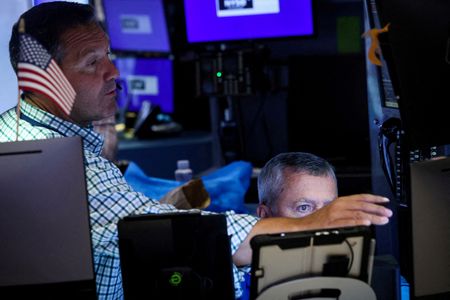By Shubham Batra and Shashwat Chauhan
(Reuters) -U.S. stock index futures tumbled on Monday, with those tied to the Nasdaq sliding almost 5%, as fears of the United States tipping into recession following weak data last week rippled through global markets.
Bourses from Asia to Europe took a beating and bond yields slid as investors rushed to safe-haven assets and bet the U.S. Federal Reserve would need to cut interest rates quickly to spur growth.
All megacap and growth stocks, the main drivers for the indexes hitting record highs earlier this year, fell sharply in premarket trading.
Apple slumped 8.4% after Berkshire Hathaway slashed its stake in the iPhone maker by almost 50%, suggesting that billionaire investor Warren Buffett is growing wary about the broader U.S. economy or stock market valuations that have gotten too high.
Nvidia slid 9.7% after reports of a delay in the launch of its upcoming artificial-intelligence chips due to design flaws. Microsoft fell 4.7%, while Alphabet slid 6%.
At 06:45 a.m. ET, Dow E-minis were down 775 points, or 1.94%, S&P 500 E-minis were down 160.75 points, or 2.99% and Nasdaq 100 E-minis were down 862 points, or 4.65%.
A weak jobs report and shrinking manufacturing activity in the world’s largest economy, coupled with dismal forecasts from the big U.S. technology firms, pushed the Nasdaq 100 and the Nasdaq Composite into a correction last week.
The disappointing jobs data also triggered what is known as the “Sahm Rule”, seen by many as a historically accurate recession indicator.
Traders now see a 98.5% probability that the U.S. central bank will cut benchmark rates by 50 basis points in September, compared to an 11% chance seen last week, according to CME’s FedWatch Tool.
Big Wall Street brokerages also revised their Fed rate projections for 2024 to show greater policy easing by the central bank.
“I am reluctant to believe the Fed would start the easing process with a 50 bps cut, but if the next seven weeks of data are consistent with this week’s, the Fed should be aggressive,” said Ronald Temple, chief market strategist at Lazard.
Yields on U.S. government bonds hit multi-month lows, with the 10-year note last at 3.7379%, while the two-year slipped to 3.7561%. [US/]
The CBOE Volatility index, also known as Wall Street’s “fear gauge”, breached its long-term average level of 20 points last week and was currently at 53.11, highest since April 2020.
A slew of Fed officials will speak on the economy and monetary policy through the week and any indication on interest rate cuts could soothe frayed nerves of investors.
Chicago Fed President Austan Goolsbee and San Francisco Fed President Mary Daly are slated to speak later in the day.
Futures tracking small-cap index Russell 2000 dipped 4.9%.
Crypto-linked stocks fell after Bitcoin hit its lowest in five months. Coinbase Global was down 13%, while MicroStrategy and Riot Platforms were down 15.8% and 12.2%, respectively.
Big U.S. lenders were down, with Bank of America leading the losses with a 4.5% fall.
(Reporting by Shubham Batra and Shashwat Chauhan in Bengaluru; Editing by Saumyadeb Chakrabarty)





